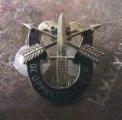Wilf,
Fair question as to why I distinguish between "armed rebellion" and "insurgency"
Several reasons go into this, and I will attempt to lay some of that out here (in no particular order as I think of them):
1. An insurgency may well manifest as an armed rebellion, and likewise an armed rebellion may well be an insurgency: But neither is necessarily the other.
2. As you say, insurgency is politics. Agreed. But not all armed rebellions are politics. Some are for power, some are for money; both of which will affect politics, but neither of which are politically driven.
3. Insurgencies require a popular base. Many armed rebellions, particularly those of the type described in #2 above, do not require and typically do not possess such a base. To lump these all together leads to inappropriate responses.
4. I strongly believe that the presence or absence of violence is a poor way to define a conflict. It is not unlike employing the presence or absence of sex to define a relationship. It is a good indicator, but it is in no way definitive.
5. knowing if the rebels are armed and violent is important for the design of my "counter-rebel" operations; but offers no clues as to what conditions must be addressed, or how those undefined conditions might best be addressed to resolve the causation for the rebellion. To simply defeat the rebels is to simply suppress the symptoms. The problem lies unaddressed and will re-emerge once the suppressive efforts relax.
6. Insurgency is internal politics rather than external politics. That is a very important distinction. If my own child is acting out improperly it is far different than if it is my neighbor's son or some stranger. Each requires unique approaches and each carries unique consequences. To ignore such distinctions is to apply a "one size fits all" solution that will likely not fit any of the three very well.
7. Western thinking on insurgency is muddied considerably by the colonial experience. Most of our COIN doctrine is based on such experiences. The US does not have COIN doctrine based on lessons learned from the founding fathers decision to scrap the Articles of Confederation in favor for our current constitution; or on the governmental strategy for resolving the growing civil rights rebellion. I suspect Great Britain does not have much COIN doctrine that is derived from her inner turmoils either (and Ireland does not count, as it was treated as a colonial operation). Instead we focus on what we learned from our efforts overseas to build and sustain colonial enterprises. That is simply not COIN at all. Dealing with an "armed rebellion" in some colonial enterprise is completely different than dealing with an "armed rebellion" at home. The stakes at home are much higher; and the residual consequences of tactical choices, win or lose, are both much higher at home.
8. Insurgency does not "just happen," nor is it the work of some "malign actor" or "ideology". Similarly insurgencies are not caused by poverty. Well governed populaces do not rise up against their governments because they are evil or because they are temporarily insane, or because they are poor. This is governmental propaganda. This is why I look at "conditions of insurgency" on a continuum from "good governance" with a satisfied populace and very low conditions of insurgency; rising up to an insurgent populace, experiencing poor governance with very high conditions of insurgency. Even a populace with high conditions of insurgency may be suppressed into inaction through governmental oppression. Such a populace may choose either violent or non-violent tactics when they do act out. Such a populace may organize and be led by internal actors, or they may be incited and supported by external actors conducting UW.
None of this can be fairly described by such a broad and inartful distinction as "armed rebellion."







Bookmarks